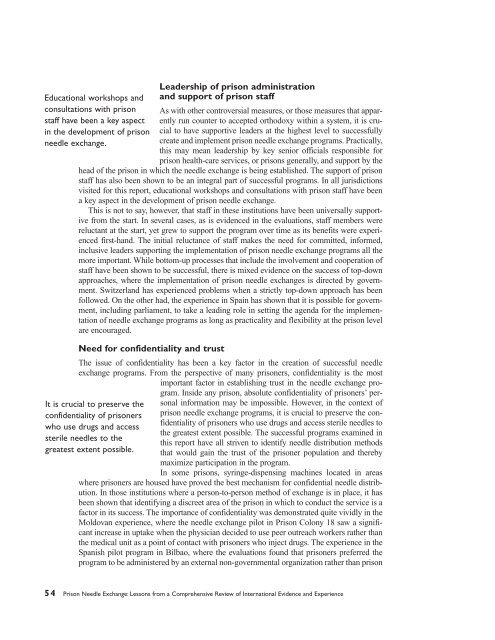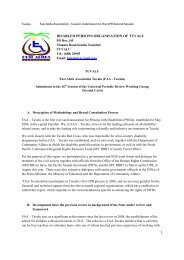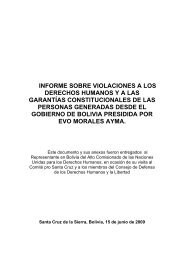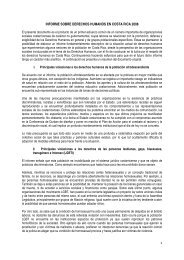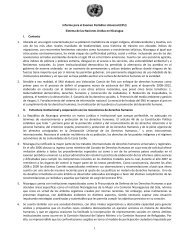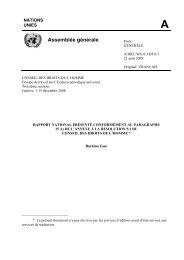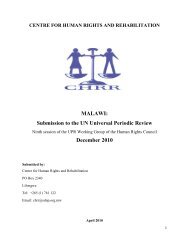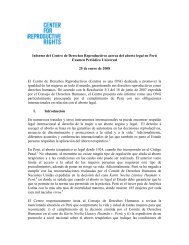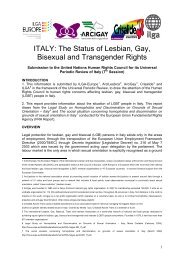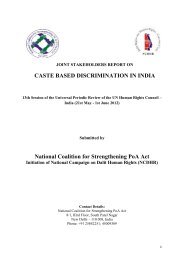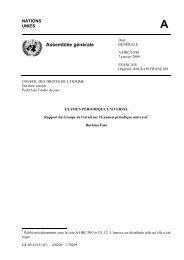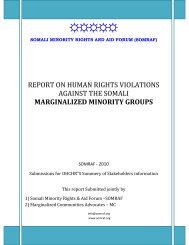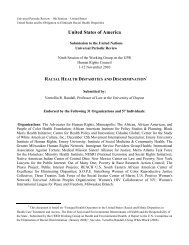Prison Needle Exchange: Lessons from a Comprehensive Review ...
Prison Needle Exchange: Lessons from a Comprehensive Review ...
Prison Needle Exchange: Lessons from a Comprehensive Review ...
You also want an ePaper? Increase the reach of your titles
YUMPU automatically turns print PDFs into web optimized ePapers that Google loves.
Educational workshops and<br />
consultations with prison<br />
staff have been a key aspect<br />
in the development of prison<br />
needle exchange.<br />
Leadership of prison administration<br />
and support of prison staff<br />
As with other controversial measures, or those measures that apparently<br />
run counter to accepted orthodoxy within a system, it is crucial<br />
to have supportive leaders at the highest level to successfully<br />
create and implement prison needle exchange programs. Practically,<br />
this may mean leadership by key senior officials responsible for<br />
prison health-care services, or prisons generally, and support by the<br />
head of the prison in which the needle exchange is being established. The support of prison<br />
staff has also been shown to be an integral part of successful programs. In all jurisdictions<br />
visited for this report, educational workshops and consultations with prison staff have been<br />
a key aspect in the development of prison needle exchange.<br />
This is not to say, however, that staff in these institutions have been universally supportive<br />
<strong>from</strong> the start. In several cases, as is evidenced in the evaluations, staff members were<br />
reluctant at the start, yet grew to support the program over time as its benefits were experienced<br />
first-hand. The initial reluctance of staff makes the need for committed, informed,<br />
inclusive leaders supporting the implementation of prison needle exchange programs all the<br />
more important. While bottom-up processes that include the involvement and cooperation of<br />
staff have been shown to be successful, there is mixed evidence on the success of top-down<br />
approaches, where the implementation of prison needle exchanges is directed by government.<br />
Switzerland has experienced problems when a strictly top-down approach has been<br />
followed. On the other had, the experience in Spain has shown that it is possible for government,<br />
including parliament, to take a leading role in setting the agenda for the implementation<br />
of needle exchange programs as long as practicality and flexibility at the prison level<br />
are encouraged.<br />
Need for confidentiality and trust<br />
The issue of confidentiality has been a key factor in the creation of successful needle<br />
exchange programs. From the perspective of many prisoners, confidentiality is the most<br />
important factor in establishing trust in the needle exchange pro-<br />
gram. Inside any prison, absolute confidentiality of prisoners’ personal<br />
information may be impossible. However, in the context of<br />
prison needle exchange programs, it is crucial to preserve the confidentiality<br />
of prisoners who use drugs and access sterile needles to<br />
the greatest extent possible. The successful programs examined in<br />
this report have all striven to identify needle distribution methods<br />
that would gain the trust of the prisoner population and thereby<br />
maximize participation in the program.<br />
In some prisons, syringe-dispensing machines located in areas<br />
where prisoners are housed have proved the best mechanism for confidential needle distribution.<br />
In those institutions where a person-to-person method of exchange is in place, it has<br />
been shown that identifying a discreet area of the prison in which to conduct the service is a<br />
factor in its success. The importance of confidentiality was demonstrated quite vividly in the<br />
Moldovan experience, where the needle exchange pilot in <strong>Prison</strong> Colony 18 saw a significant<br />
increase in uptake when the physician decided to use peer outreach workers rather than<br />
the medical unit as a point of contact with prisoners who inject drugs. The experience in the<br />
Spanish pilot program in Bilbao, where the evaluations found that prisoners preferred the<br />
program to be administered by an external non-governmental organization rather than prison<br />
It is crucial to preserve the<br />
confidentiality of prisoners<br />
who use drugs and access<br />
sterile needles to the<br />
greatest extent possible.<br />
54 <strong>Prison</strong> <strong>Needle</strong> <strong>Exchange</strong>: <strong>Lessons</strong> <strong>from</strong> a <strong>Comprehensive</strong> <strong>Review</strong> of International Evidence and Experience


